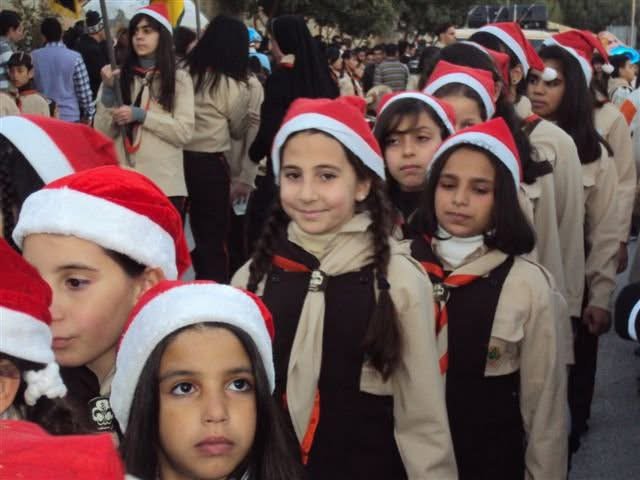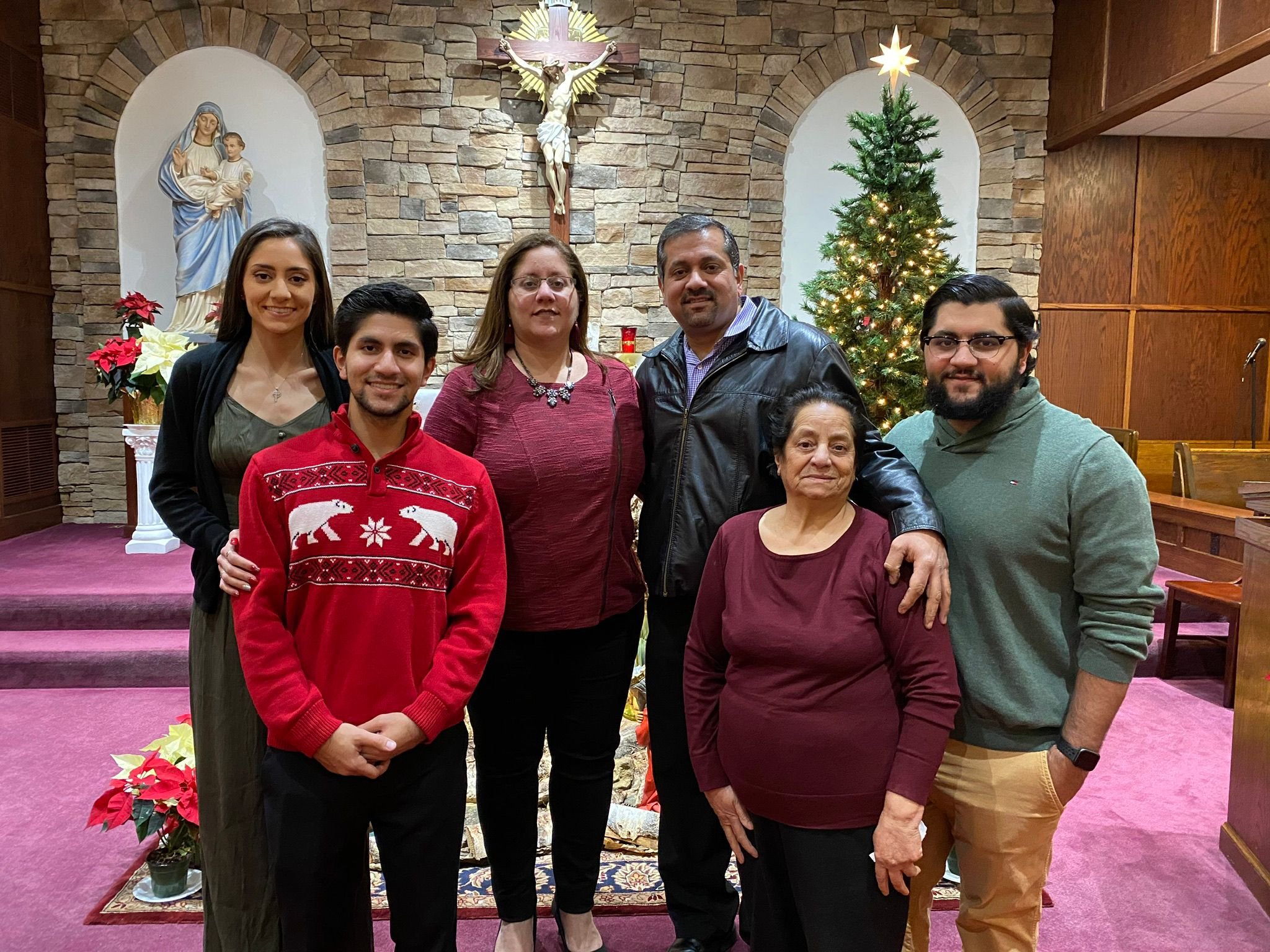Philadelphia’s Palestinian Christians Mourn During a Bleak Christmas
Elissa Odeh
As Christmas approaches in Philadelphia, traditional American Christmas customs abound, including shopping frenzies and bulk Amazon hauls. Yet, these customs often feel foreign to the city’s Palestinian Christians who find themselves longing for the traditions they observed in Palestine. Some reflect on their ties to the holiday’s roots. Specifically, many shift their gaze to the West Bank city of Bethlehem, the place that Christians honor as the birthplace of Jesus.
Palestinian father of three, Issa Odeh, comes from Bethlehem. He moved his family to the United States seven years ago and settled in Lansdale, PA. His ancestors originally hail from Beit Sahour, originally known as the ‘Village of the Shepherds,’ just a stones-throw from Bethlehem.
“I always say we are the first Christians because we descend from the shepherds who spread the news of Christ’s birth,” Odeh told Al-Bustan News. “I find it funny when people ask us Palestinians if we converted to Christianity, when in fact, we were the first ones to believe in it.”
Odeh reminisces about the quiet peaceful Christmas of his youth in Bethlehem — far from the sleigh bells and candy canes that most Americans associate with the holiday.
Lansdale-based Palestinian Issa Odeh moved his family to Pennsylvania from the West Bank. Pictured above, Odeh’s daughter, Jessica, center, marches in the annual Christmas scout parade in the biblical town of Bethlehem during the 2011 Procession of the Patriarch. Photo courtesy: the Odeh Family.
Odeh said his experience of the one-day Christmas holiday in the United States pales in comparison to his experience of the holiday in Palestine, where it is celebrated during monthlong festivities.
“Celebrations usually start with performances of hymns and prayers, followed by the lighting of the Christmas tree in front of the Nativity Church where Jesus was born, honoring the beginning of the holy season,” said Odeh.
Thousands of Palestinians from throughout Palestine — Christians and Muslims alike — visit Bethlehem for the most anticipated part of Christmas: the Procession of the Patriarch, which Catholics celebrate on December 24th and which the Orthodox celebrate on January 6th.
“On those days, scouts march throughout the streets of the old city of Bethlehem playing the drums and bagpipes, until they reach the Nativity Church to welcome the patriarch and hold prayers,” said Odeh, adding, “It’s a celebration that joyfully brings everyone together.”
Afterwards, Odeh said, a midnight mass is held at the Nativity Church.
Above, Odeh’s daughter, center, marches in the annual Christmas scout parade in the biblical town of Bethlehem in 2011 during the Procession of the Patriarch. Photo courtesy: the Odeh Family.
Despite the passage of time since immigrating to the U.S., the Odeh family continues to miss the Christmas spirit of Bethlehem. To ease the longing and loss, they find themselves connecting with other Palestinian families in Philadelphia, with whom they can share their rituals and traditions.
The Muqbels are one such family. They hail from Taybeh, a small Christian village in the West Bank, where villagers uphold traditions that have been passed down to them by their ancestors.
Najat Muqbel, a Palestinian American and mother of three, was raised in South Philadelphia where her relatives created a small version of Taybeh by bringing together Palestinians from across the city for meals and holidays.
“We had weekly gatherings in our house and at our relatives' house, where traditional Palestinian meals were served,” Muqbel told Al-Bustan News. “We sang folk songs and played instruments: the oud, the shibbabeh, and the tableh. And our elders shared stories about their hometown, their childhood and customs.”
Muqbel was raised to cherish her Palestinian heritage. “It was very important to my husband and I that our kids know about their homeland,” said Muqbel.
Muqbel laments the commercialization of Christmas in the U.S., which she said contrasts sharply with its practice in Palestine.
“In Palestine, the holiday is really focused on the weeks leading up to the birth of Jesus,” said Muqbel. “The true meaning of Christmas is Jesus, giving to the less fortunate, and expressions of gratitude and humility.”
Palestinian American Najat Muqbel is pictured above, at center, with her family during Christmas at Saint Sharbel Maronite Catholic Church in Newtown Square, PA. Photo courtesy: Najat Muqbel.
Today, Muqbel passes on many of her parents’ teachings and customs to her children. Years ago, Muqbel's parents started a family Christmas tradition: they displayed a nativity scene outside their home. Today the tradition lives on through Muqbel, her husband Yousef, and their children, who display a nativity scene that was manufactured in Bethlehem from olive wood. It reminds Muqbel of the lone Christmas she spent in Palestine.
Palestinian Americans are mourning as they watch devastation unfolding in their homeland with no end in sight. “While we feel hopeless, many Palestinians in the Philadelphia area are doing their best to stand together in solidarity with our suffering brethren,” said Najat.
American-born Robert Moyer of Doylestown, PA, is an Odeh family friend, who experienced his first Christmas in Palestine in 1968, when he traveled as a Mennonite missionary to teach at a boys’ boarding school in Beit Jala, a village located approximately 1.5 miles from Bethlehem. Having just arrived in Palestine shortly before the holiday, he noticed the simplicity of Christmas celebrations in Bethlehem. It forever changed his perception of the holiday.
“I didn’t see stacks of wrapped presents,” Moyer told Al-Bustan News. “But what I did experience was Palestinians’ hospitality. We celebrated Christmas by sharing food, eating together around the table, and having meaningful conversations.”
Moyer’s favorite memories include visiting the Nativity Church and walking in the streets of Bethlehem during the festivities.
The Odeh and Muqbel families are among several Palestinian families in Pennsylvania to attend Christmas services at Saint Sharbel Maronite Catholic Church in Newtown Square, PA, pictured above. Photo courtesy: Saint Sharbel Church.
After returning to the Philadelphia suburbs, he began to weave Palestinian traditions into his own Christmas celebrations, displaying a nativity set from olive wood under his tree to remind him of his time in Bethlehem.
Both the Odehs and Muqbels are among several Palestinian Christian families in Philadephia who have found a home at local Lebanese churches where they can connect with other Arabs. They both attend St. Sharbel Lebanese Church in Newtown Square.
As Christmas nears, many of Philadelphia’s Palestinian Christians comes together to revive the tale of the very first Christmas, holding on to their connection to it.
“Christmas is a continuous reminder that Palestinian Christians do exist and will continue to exist,” said Odeh. “Even if the world forgets about us, we continue to tell people that we are here and we are not going anywhere.”
***
Elissa Odeh is a Palestinian journalist from Lansdale, PA. She graduated from West Chester University with a BA in media and culture and a minor in journalism. Her work has been published in Lehigh Daily, Daily Local, and the New Orleans Review.




